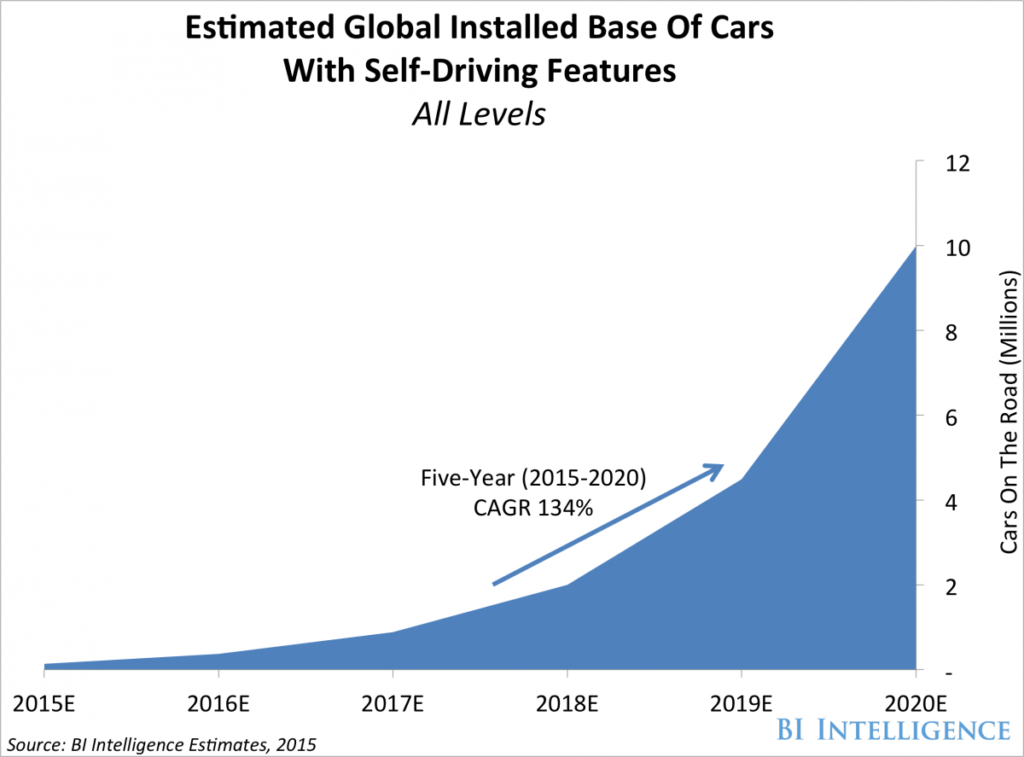The Internet of Things (IoT) is the new playground for hackers and cybercriminals. As more devices get connected to the Internet, the exposure to cyber attacks is something we simply cannot afford to ignore. From smart devices being hacked to self-driving cars being “hack-jacked”, the future holds many unknown variables when it comes to cybersecurity.
It is estimated that, by the year 2020, there will be 10 million self-driving cars on the road, according to an in-depth study by Business Insider last year. Here are their projections:

That means 10 million chunks of metal easily weighing more than a ton each let loose on public roads and controlled by nothing more than software – software that can be hacked.
Last year, the botnet attack in the United States took out several large websites, and it was only possible because of the myriad unprotected connected devices currently online. As the Internet of Things connected devices proliferate around the world, the problem is only going to get bigger.
And self-driving cars are merely adding to that volume of connected devices that are open to cybersecurity breaches.
But a self-driving car being hacked is possibly much more of a scary notion that your home security CCTV system.
Imagine laying back in the driver’s seat and settling in for a nice three-hour drive to somewhere, only to find that your car has been hacked and is headed in an entirely different direction, with no way for you to override the autonomous system. Not a pleasant situation to find yourself in, right?
Sadly, that’s a very real possibility, as is the possibility of self-driving cars being used to commit or aid in the committing of a crime. But there are other dangers as well.
In a recent survey conducted by the University of Michigan’s sustainable transport director Michael Sivak, it was found that 21.6% of the respondents were worried about autonomous cars being hacked merely for the purpose of stealing personal travel patterns.
So, what can technology companies do to pre-empt such attacks?
One solution seems to have come from Kaspersky Lab, the Russian antivirus software maker. After 14 years of development, the company has finally released its KasperskyOS, which is essentially a purpose-built and secure-by-design operating system where only specified code will be allowed to run.
KasperskyOS Internet-of-Things-Specific OS Released after 14 Years of Dev
The new OS is intended for mission-critical industrial control systems, but can be customized for any IoT system that requires only allowable code to be executed. Such an operating system could effectively reduce the vulnerability of the connected device in question – in this case, self-driving cars.
These are the kinds of solutions that autonomous technology researchers will need to mull over before large-scale deployment of self-driving cars becomes a reality. Proprietary operating systems are just one solution, and other solutions will undoubtedly evolve over time.
The important thing for consumers to be aware of is that this is a real problem that’s going to rear its ugly head in the next five to ten years. We’re firmly headed towards a future where self-driving cars will be the norm, but along with the many benefits that will bring, we should also be aware of the risks involved in this major shift in automobile technology.
Thanks for reading our work! We invite you to check out our Essentials of Cloud Computing page, which covers the basics of cloud computing, its components, various deployment models, historical, current and forecast data for the cloud computing industry, and even a glossary of cloud computing terms.



